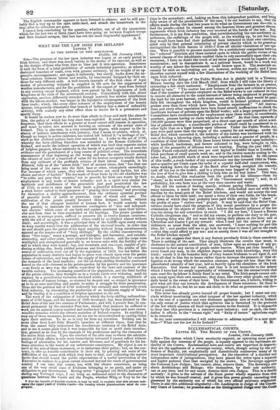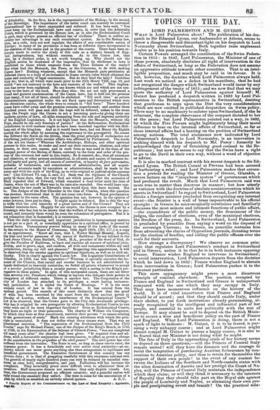ECCLESIASTICAL COURTS.
LETTER IIL THE RIGHTS OF THE CHOW/Q.
London, 19th i January 1848.
Sin—The system which I have succinctly exposed, as operating Met power fully against the interests of the people, is equally opposed to the legitimate au- thority of the Crown. Ecclesiastical laws and courte are imperil/4m in imperio: they are the appliances of a sovereign society, which, though acting by the suf- ferance of Royalty, yet emphatically and diametrically contravene many of its most important constitutional prerogatives. As the executive of a distinct and independent order of jurisprudence, they have placed the mitre upon a separate and higher pedestal than that occupied by the crown. The Sovereign appoints the Common Law Judges; but cannot, alone, remove them. The Sovereign also elects Archbishops and Bishops; who themselves, by their sole authority, can at any time, and for any cause, dismiss their own Judges. This is a double anomaly: it gives to the servant of the State power wholly separate from that by which he was himself created, and it gives him power greatly exceeding that possessed by the authority out of which his own official existence originated-
i 'here s also this additional singularity—Dr. Lushington is Judge of the Consis- tory Court of London; he presides also as the distinguished Judge over the Court
of Admiralty. In the first, he is the representative of the Bishop; in the second, of the Sovereign. The importance of the latter court can scarcely be overrated. International law is there expounded and enforced. It has been said, " You must keep up the Ecclesiastical laws and courts, in order that the Admiralty
i
Court, which s governed by the Roman law, as is also the Ecclesiastical Court in part, may always possess an efficient bar of civilians." There is neither ne- cessity nor advantage in any such roundabout system. As to the Roman law, that, as a code, does not now regulate the affairs of any considerable nation of Europe; in many of its provisions it has been at different times incorporated in the statutes of the realm and in the practice of the courts. There have been at- tempts made to revive the study of this code as a distinct branch of Eng- lish jurisprudence, but without success. As to the Canon Law, that also, as a distinct order, is not worth keeping up. Why should not the English nation be disabused of the impression, that its obedience to laws is restricted to those which emanate from the Three Estates of the realm? But what had the Monarch, the Peers, or the Commons to do with making Canon law? Nothing whatever, except that the Monarch gave permission at different times to a body of eccleLastics to frame certain rates which obtained the name and authority of legal enactments. But do they bind the laity? Doubtless they do; that is, all which were made prior to the 25th Menu VIII. cap. 19, and which "are not contrary to the laws and customs of the realm." This implica- tion has never been explained. No one knows which are and which are not con- trary to the laws of the land. More than this: the act not only pronounced a broad and general condemnation of the Canon laws, bat it held out the promise that many, if not all of them, should be abolished. "Till such time" as certain Commissioners appointed under the act fixed upon and determined which were the obnoxious canons, the whole were to remain in "fall force." Three hundred years have rolled away and the promise remains unperformed; and another three hundred years will pass and still the hope will be deferred, unless in the mean time the People urge the Crown to act a becoming part—by giving them one uniform system of laws, all alike emanating from the sole and supreme authority of the English Legislature. Is it not high time that the Monarch, without the Pope, should be the only fountain of justice? At the Reformation, Ecclesiastical jurisdiction in civil matters ought to have been banished together with his Holi- ness out of the kingdom. And so it would have been, had not Henry the Eighth spoiled the whole affair by annexing the supremacy to the prerogative. No sooner was Edward the Sixth on the throne, than the great principle of ecclesiastics not interfering judicially with secular affairs was affirmed by Parliament. The words of the act are these—" Whereas the Archbishops, Bishops, and other spiritual persons in this realm, do make and send out their summons, citations, and other process, in their own names, and in such form as was used in the time of the warped power of the Bishop of Rome, contrary to the form and order of the pro- cess of the common law used in this realm: Be it enacted, &c., that all summons and citations, or other process ecclesiastical, in all suits and causes of instance be- twixt party and party, and all causes of correction, or inquiry de jure patronatus, probates of testaments, and commissions of administration and all acquit- tances.of accounts made by executors or administrators, shall be made in the name and with the style of the King, as in writs original or judicial atthe common law." (1st Edward VI. cap. ii. sect- 3.) Such was the vigilance of the Church party in those days, that the very first act which passed after the accession of Mary repealed that of Edward, which remained a dead letter until the time of James, when the act of Mary was in its tum also repealed. One would have sup- posed that the law made in Edward's time would upon this have revived. Not so. The Judges of the Star Chamber in the time of Charles, when this question was mooted, determiaed that it did not come iota force. A Royal proclamation alto issued to the seine effect. The question has not, however, in the opinion of some lawyers, been put to sleep. It might again be debated. But is this the way to trifle with the civil interests of a great nation and of the Crown? They are blended interests here. Happily for our empire, the throne is now occupied by a Sovereign who has but to be shown that the welfare of her subjects would be pro- moted, and instantly there would be even the relaxation of prerogative. But it in not relaxation that is demanded; it is restoration.
That the daily increasing and important jurisdiction in testamentary matters is not per se a part of, or essentially appertains to a spiritual office, is proved by several Acts. Testamentary powers belong to many of the lords of the manor. In thereturn to the House of Commons, 16th April 1829, (No. 177,) is a copy of an appointment- "Know all men, that I, Walter Michael lloseley, Esquire, the true and lawful possessor of the manor of Buildwas: To my beloved in the Lord Jesus Christ, John Bartlett,, Clerk, M.A., preacher of the word of God, do give the Peculiar of Bnildwas, to have and exercise all manner of spiritual juris- diction, and to prove, sign, and confirm, all wills and testaments within my said jurisdiction, during my will and pleasure." Respecting this appointment, it will be observed that the secular appoints to spiritual functions as well as to civil au- thority. This is clearly against the Canon law. The Leiantine Constitutions of Othobon, in 1268, has this injunction—" Whereas it specially concerns the ho- nours of the Church, that carnal and secular business be not administered by hands dedicated to heavenly ministries, we forbid all priests whatsoever to accept of a secular jurisdiction from a secular person: with a saving to the King's pre- rogative in these points." In spite of this unrepealed canon, there are not fewer than seventy-two Peculiars which belong to laymen who delegate their powers to clergymen of different ranks. There is another fact. The Corporation of the city of London has attached to its privileges a court having testamen- tary jurisdiction. It is styled the Court of Hustings. " It is the most ancient court of law in the city of London. It has existed from the earliest period. The records of this court distinctly show that the proof of wills has been exercised by this court from the most ancient period in thecity of London, without the interference of the Ecclesiastical Courts.'5 Let it be observed, that the Crown gave to the City this invaluable privilege: why has it crippled its own prerogative by allowing Ecclesiastical Courts to run away with one of its most important functions? Even as Ecclesiastical Courts, they have no right to their possession. The charter of William the Conqueror, by which they were at first constituted, restricts their powers "to causes relating to the government of souls." Mark the cunning adroitness with which the prin- ciple is enunciated. It does not define what those causes were. That was an intentional omission. "The separation of the Ecclesiastical from the Civil Courts." says Sir Michael Foster, one of the Judges of the King's Bench, in 1735 or 1736, in his Examination of the Scheme of Church Power, "was not completed till many years after" the charter had been given. "It required time and ad- dress, with a favourable conjunction of circumstances, to effect. so great a change in the constitution to the prejudice of the civil power." The civil power has ever suffered from the innovation. The State is not, so long as these courts exist, the supreme power. It has a formidable and ever active rival authority—an au- thority which can never prove anything else than antagonistic to legitimate and beneficial government. The Executive Government of this country has one obvious duty; it is that of grappling manfully with this enormous national evil. Tile growth of nearly eight hundred years can only be reduced by remedial mea- sures at once bold, comprehensive, and just. Palliatives will but increase the complaint- They invariably prove more difficult even to administer than al- teratives. Half measures disarm not enemies; they only dispirit friends. Let, then, the Government propound an efficient curative; and a grateful nation will rally round the standard they unfurl. The time is come for the enunciation of a Plan by which to establish an entirely altered system. A. E. C.
• Fourth Report of the Commissioners on the Law of Real Property; Appendix,



























 Previous page
Previous page